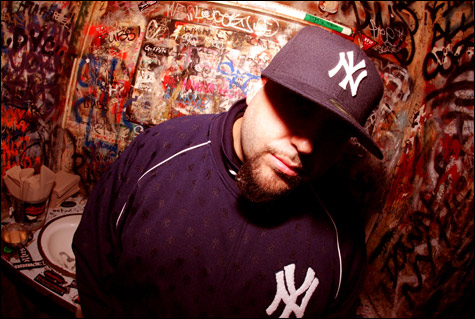
ILL IS ILL: He’s not necessarily a changed man — his lyrics indicate that he’s still a conspiratorially aggressive “American who needs a blow job and a pizza.” |
As much as Ill Bill eschews clichés, the Brooklyn rap goon is either a righteous friend or a torrential enemy. Last week at Quad Studios in Times Square, he proved to be the former. Five years ago at Brooklyn club Southpaw, he was nearly the latter.The magazine I wrote for at the time had given me a simple assignment: find Ill Bill before his show and ask questions about the new disc by Non-Phixion — his now-defunct white-rogue rhyme syndicate. What my editor had failed to mention was that Bill had issues with the publication after it went bourgeois and stopped regular coverage of him. Never mind that I was there to interview his crew, homeboy was unhappy. Usually I can weasel out of such corners, but Bill was not interested in my “don’t crack the middle man” reasoning. Even worse, as I stared up at his Jurassic 6’4” frame dipped in a black down jacket larger than my bedspread, I realized there was no fighting back. The situation had savage beatdown etched all over it.

But then Bill’s friend ran up with the news that they had a beef down the block. Like that, they bounced outside to settle scores, and I was saved by the bell. When they returned, I bought a round of Narragansett tallboys and made peace. I never got the interview, but I didn’t get maimed, either.
I’ve been afraid of Bill ever since, my fears being exacerbated when he knocked down a kid for throwing water on stage during a performance at the Middle East two years ago. His lyrics also sting. When 50 Cent raps, “I still kill,” the only ones who need to worry are his girlfriends and his bastard children; when Bill declares himself Brooklyn’s undefeated knockout champ, that’s because he might just slap you down. Along with his blood brother, evil rap genius Necro, Bill was one of the few white or Jewish kids in Coney Island’s Glenwood Projects, where his uncle shot dope, his parents fought violently, and, as Bill details, drug dealers snuffed the teachers while cheerleaders sucked dick under the bleachers. In short, he’s been tried and tested.
As I enter the studio to interview Bill for the first time in person since he almost parked his fist into my jaw, I consider several things. I imagine that he plays few games with smart-ass whiteboys like me. I also imagine that he’s settled down some. Over the past half-decade, his legend has grown from alternatively notorious to internationally iconic. Through his work with honky hip-hop all-star squad La Coka Nostra — whose members include Southie rap sleaze Slaine and all three House of Pain stalwarts — Bill has toured Europe and the States extensively, and he’s appeared on the cover of the UK’s Hip-Hop Connection twice. He’s also gotten married and become a first-time father — milestones that often calm even the wildest of hoodlums.
“That was just a big misunderstanding,” he says of our Southpaw run-in. “I guess you could say that I’m more mature now, though — you can hear on my new record that this is the happiest time of my life. If anything, my biggest fear with this record is that people who weren’t 100 percent into my music before won’t give this a chance. The last one was precise — like Charles Bronson with a sniper rifle or getting hit over the head with a hammer. This album is epic — it’s like an army steamrolling over everything.”
It turns out Bill is a nice guy, or at least the nicest guy I’ve ever met with Charles Manson’s portrait on his T-shirt. He’s not necessarily a changed man — the lyrics on his new Hour of Reprisal indicate that he’s still a conspiratorially aggressive “American who needs a blow job and a pizza” — but he is a businessman who can separate the street-villain edge from his entrepreneurial and human sides. That said, I’m amazed that he isn’t seething over Warner Music Group’s withdrawal from the distribution deal they signed last year. Surely the major label’s rejection of his populist rhymes about socio-economic injustice and institutionalized hypocrisy was enough to get him swinging.
“They don’t give a shit about artists,” he says about Warner, which maintained publishing rights to Reprisal for film, television, and video-game placements. “Nobody there even heard the record, so they didn’t know what they had when I walked with my masters. The major-label system is not only on fire right now — it’s burning to the ground. But it was good for my pockets: they paid me and spent more than a quarter of a million dollars building a studio in my house.”